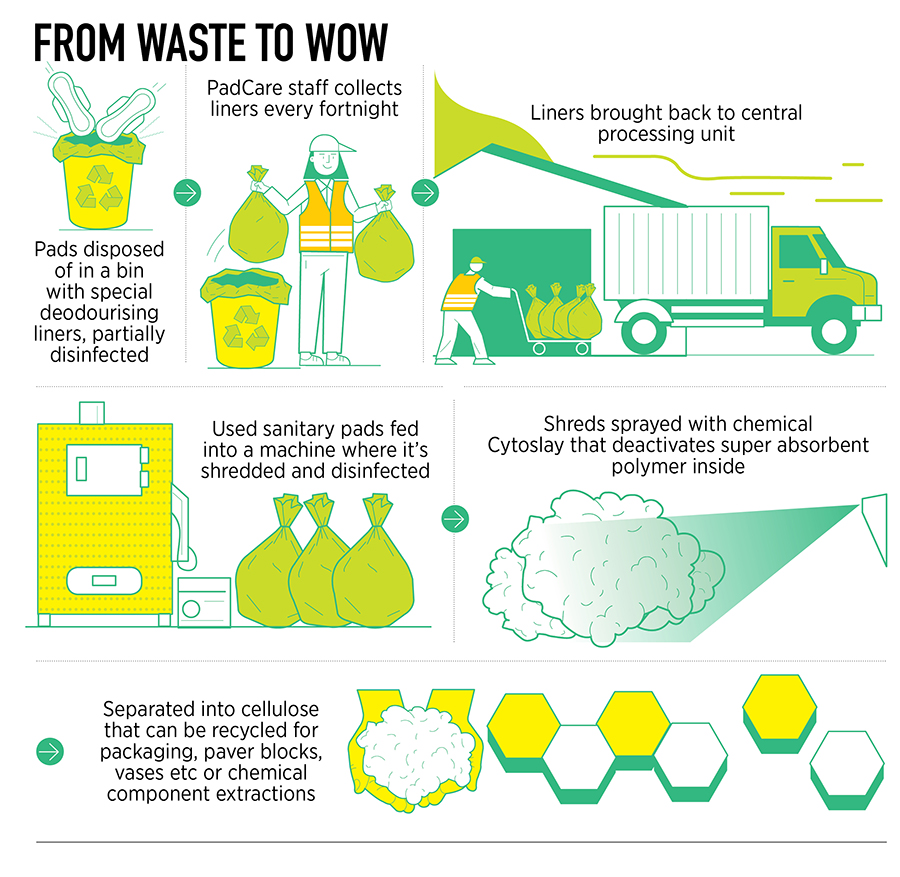
In conversation with Ajinkya Dhariya, CEO and Founder of Padcare Labs:
What’s your backstory and how did you come up with the idea?
During my engineering days, I once saw waste-pickers separating diapers and other noxious sanitary waste like used pads by hand. I was curious to know the origin of the waste & how they would be disposed eventually. So I asked the workers these questions, but unfortunately they did not know. Fortunately, however, my mother worked in the social sector and for women’s empowerment, and using her connects it didn’t take me long to figure out that the waste generated from sanitary napkins & diapers usually ended up in landfills and water bodies: un-segregated and unhygienic, while their super-absorbent polymer sucked up vast reserves of the freshwater supply. This immediately prompted me to notice that there lay a problem with this waste disposal system.
Upon conducting further research, I found out that around 336 million Indian girls and women are of reproductive age, meaning that most of them would be menstruating. Of them, around one third, mostly urban women, are expected to use disposable sanitary pads, according to data by Menstrual Health Alliance India. On average, a girl uses eight sanitary napkins during her monthly cycle, which means that around 12.3 billion pads are being disposed of every year, leading to an annual menstrual waste of 113,000 tonnes, which is adding to the toxic heap at landfills.
Tell us more about the technology.
We have approached this problem by breaking down the waste management process in to four simple steps. First is segregation. Women can separate their sanitary waste from general trash at the source level by using PadCare bins. These automated bins installed in the washrooms are touch free & odorless, and can hold the waste in a hygienic manner until the next step of collection. Our waste-management partners collect the waste when the Padcare bin is full (roughly once a month) and drop it off at the Central Processing Unit. Next step is processing. The waste is shredded and disinfected through a chemo-mechanical process in the smokeless unit founded on ‘5D technology’ (disinfection, deodorization, decolorization, disintegration & deactivation of super absorbent polymer). The final step is recycling of the waste into completely harmless, odourless and sterilized recyclable cellulose and the plastic material is given a new life.
 Image taken from Forbes India
Image taken from Forbes India
What is the impact of your work?
PadCare provides subscription model services to educational institutes, corporate parks, government bodies, public places such as airports etc. We currently operate in Pune, Mumbai, Bangalore, & Gurugram serving reputed clientele like P&G, Mahindra & Mahindra, State Bank of India, JSW, Puma, and ICICI Lombard. Combined, we serve over 40+ corporate clients with 50,000+ daily users, and we recycle 1,00,000+ pads every month. This effort has led to an overall reduction of about 1 metric ton of carbon emissions. We plan to further expand our services by offering our services to housing societies.
PadCare’s holistic and advanced menstrual waste management system substantially reduces the number of deaths and illnesses caused by air, water and soil pollution that may be induced by otherwise buried or burnt pads. After the pads are collected, they are processed with our 5D technology to yield separated cellulose and plastic. These materials can be further used to make packaging materials, composites, filler materials in construction, and in the paper and pulp industry, etc. Our vision and our which aligns with many United Nations’ Sustainable Development Goals.
Finally, we have made a difference in the lives of waste pickers as well. Improper disposal of sanitary napkins and diapers is not only hazardous for the environment, but they also pose a threat to the health of these workers. They, unwillingly, have to pick up such bio-hazardous waste due to their job, which can lead to skin diseases. Moreover, even among sanitation workers, those who deal with sanitary or diaper waste, are the lowest rung, and are looked down upon. We have taken such workers onboard as service executives for PadCare. Now, they can safely collect this waste from our clients and deliver it to our processing units, and they no longer need to trawl through filthy sanitary waste. Moreover, it helps add dignity to their job, and increases their respect among peers.
In addition to all of the above, we help increase awareness around menstrual hygiene through awareness camps for our clients, and solve the problem around accessibility of sanitary napkins through padcare vending machines.
Our complete menstrual hygiene solution creates employment opportunities, takes care of the health of sanitation workers, while simultaneously helping the environment by effectively recycling waste, thus aligning with many United Nations’ Sustainable Development Goals.
How was Padcare’s journey funded?
Fellowships and Grants
- BIRAC SOCH
- NITI-AYOG – Atal New Innovation India Challenge
- BIRAG Biotechnology Ignition Grant
Awards
- 15 lacs order from the Government of Maharashtra for being a winner at Maharashtra Startup Week
Equity
- BIRAC-LEAP Fund (hosted by Venture Center)
What do you think were the key reasons for the success of Padcare Labs?
Firstly, it’s because of our team who are so dedicated to what they do, not bothering about society and the many taboos around this topic. Next, it’s very important to design your product keeping the needs of the customers in mind. Another thing that helped a lot was to interact with customers very early on, and obtain valuable feedback during the product development stage. Understanding what your customers want, and designing accordingly. Finally, it’s important to leverage the ecosystem, and in that respect, we were lucky to have got a lot of support from both government and private sector.
